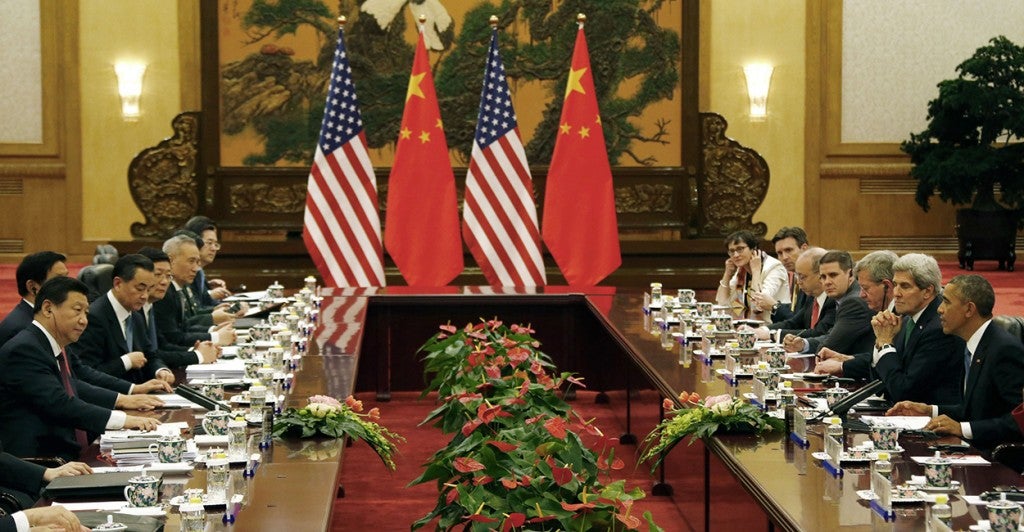President Obama may be poisoning the well with his executive action on immigration, but in at least one area there was welcome bipartisan comity in Washington in this post-election week: Hong Kong. Even the president seems to be coming along on this one.
On Thursday, the Congressional-Executive Commission on China unveiled House and Senate bills that would fix one aspect of the law that governs U.S. relations with Hong Kong, the U.S.-Hong Kong Policy Act of 1992. The fix, much sought by pro-democracy leaders in the city that Britain ceded to China in 1997, would require the president to certify that Hong Kong is indeed autonomous before exempting it from any new law, agreement or arrangement applicable to the People’s Republic of China. It also reinstates the State Department’s annual reports on Hong Kong.
Hundreds of thousands of demonstrators have taken to the streets of Hong Kong since June to demand that China give them the ability to elect a leader of their choosing, even as the city remains under the ultimate control of the Communist Party in Beijing. China promised Britain, Hong Kong (and the world) before the handover took place that the city would have a “high degree of autonomy.”
“The steady erosion of Hong Kong’s autonomy is the concern of freedom-loving people everywhere,” Rep. Chris Smith, R-N.J., the principal sponsor of the House bill, said. “Hong Kong’s unique system has ensured prosperity and spurred the type of creativity and vitality that only comes with the advancement of fundamental freedoms. Protecting these freedoms are a bedrock interest of U.S. foreign policy.”
“The U.S. should make clear that we stand on the side of the democratic aspirations of the people of Hong Kong and against attempts to suppress their voices. This legislation would provide a much-needed update to existing laws regarding the U.S.-Hong Kong relationship and help to ensure that Hong Kong remains truly autonomous from Beijing,” said Sen. Marco Rubio, R-Fla., the Republican ranking member of the Senate Foreign Relations East Asian and Pacific Affairs Subcommittee and one of the sponsors of the Senate bill.
Hong Kong pro-democracy leaders such as Martin Lee and Anson Chan traveled to Washington in the spring to seek the resumption of the annual certifications, which were allowed to lapse in 2007.
Our consulate in Hong Kong for all intents and purposes washed its hands of the demonstrations in September, issuing a statement that read:
“We do not take sides in the discussion of Hong Kong’s political development, nor do we support any particular individuals or groups involved in it. … We encourage all sides to refrain from actions that would further escalate tensions, to exercise restraint and to express views on (Hong Kong’s) political development in a peaceful manner.”
Obama himself initially toed a similarly careful line during his visit to Beijing. He recovered, however, at the joint press conference with Chinese President Xi Jinping, saying that the “United States, as a matter of foreign policy but also a matter of our values, are going to consistently speak out on the right of people to express themselves, and encourage the elections that take place in Hong Kong are transparent and fair and reflective of the opinions of people there.”
That is as it should be. To do otherwise would contravene the Hong Kong Policy Act, which states that “support for democratization is a fundamental principle of United States foreign policy. As such, it naturally applies to United States policy toward Hong Kong.”
It is also at odds with U.S. traditions. Policy makers going back to the Founding Fathers have shown an aversion to striking neutral poses in what James Madison called “the great struggle of the epoch between liberty and despotism.”
Oftentimes Congress has needed to step in to force an administration’s hands—as the House did in 1821 when it voted to push a reluctant President James Monroe to recognize the Latin American republics striving for independence from Spain. It is a welcome sign that the outgoing Congress is stepping in. Though in most cases it is best for a lame-duck Congress to do as little as possible, this bipartisan action has merit.
